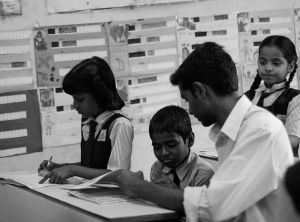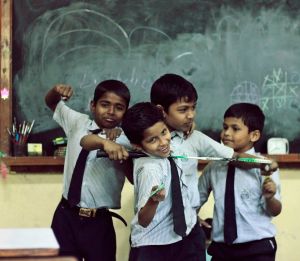After the awe of seeing the red bricks subsided, one of the first feelings I remember from my day of arrival at Wimwi* is the intense disappointment on seeing the dorm* room allotted to me – old, nearly unfurnished, paint flaking off and falling to the bed along one entire wall. Dilapidated, in one word. To think that this was what I had “achieved!” I was immediately and very kindly allowed to change my room. And after that first day, I don’t remember ever having had a chance to reflect on the quality of my accommodation.
<Before we proceed any further, some comments are in order. In this post I have used terms commonly used at IIMA – these are indicated by * at their first occurrence and explained at the end of the article. This post is also on the longer side, so please be warned. But if it is as much fun reading as it was writing, you wouldn’t notice the length.>
Going back to campus after a hiatus of a year and a half, the overwhelming sense of homecoming eclipsed all other feelings. The dorm room I got this time was no better, but time had changed my perspective so much that campus felt like a nature resort. And the days passed by in a rush. I strongly suspect that time runs at a different speed at Wimwi. Time is also scarcer, and hence more valuable and more valued, at Wimwi than anywhere else in the world.
Fences and facilities
I noticed that the campus seemed demarcated by fences in an attempt to keep away the stray dogs, a vain attempt because the gates of the fences usually remained open. Indeed, there is something about an academic institution that makes spirits far freer than in an organization that pays a salary for working, for keeping your ideas to yourself and for doing what you are told. In the latter, the chaos of enterprising free human minds is mercilessly reined in by rewarding subordination.
It was heartening to see the new sports complex, with an indoor badminton court – so what if it was not equipped with the best of lighting? And the SAB, the Student Activities Block, which has been a long time coming; the new super posh dorms of rooms with attached bathrooms – a rare luxury for the students of Wimwi; two more ATMs, in the right places; more, and yet inadequate, signboards to indicate directions to dorms and facilities in a campus that seems like a maze even to seasoned residents.
Food and fauna
I spotted more eating joints – the expensive but healthy Joos has been relegated to the realm of memories and only the space remains, as if awaiting a new occupant; there is Falafal (think Hindi not Lebanese) aimed at the same I-care-more-about-health-than-wealth customers (I exaggerate, of course); a Nescafe right near the girls’ dorms; an enlarged Nescafe in the new campus. And KLMDC* still sells home-made cookies, these are still just as popular; the fruit vendor still enjoys a monopoly; tiffin deliveries take place as usual, of packed lunches that look unhygienic but taste genuine like only home-cooked food does; the food in the student mess has expectedly gotten worse over the years and subscription seems to have fallen each year.
The animal kingdom at Wimwi has not diminished even one bit. At Falafal, a bold squirrel approached till the seat opposite mine, and stood poised to land in my plate with its next jump. I threw a yellowed neem leaf to the floor and the squirrel, well-trained as it must have been from numerous titbits thrown by residents, ran towards the leaf. But very soon it was back, and this time I broke up a corner of my bread slice and offered that. The squirrel sniffed around, but could not (deliberately did not?) spot the meal, and returned to its pose, again ready to jump onto my plate. In the meantime, another squirrel grabbed the bread piece and ran away. I have a feeling that squirrel one often helps its brothers this way. In the land of RG-giri* this was a refreshing sight.
Reading, living and studying
The best-kept secret of the Wimwi campus, VSL, or the grand old Vikram Sarabhai Library, is still majestic and well-maintained. It hasn’t lost its charming effect on me – within minutes of entering the welcoming silence, I noticed and picked up Stephen King’s ‘On Writing’ in the new arrivals section and Peter Drucker’s ‘Adventures of a Bystander’ in the shelves, both of which I had been planning to read.
In dorm 3, the same old almost shelf-less fridge reigns over the pantry, but the new microwave oven has stolen the spotlight from the old one; the basement, known lovingly among current and former residents as the dungeon, still has some of the least wanted rooms and the most well-bonded group of residents; the erstwhile cleaning lady has been moved out, but the mildly servile attitude has remained, now shown by the new cleaning lady.
There is no more a WAC run* because electrons run faster and the Internet has taken over the work of fast feet. But Turnitin* does its job just as skillfully. And the 2.30pm surprise quizzes are back in the system (after having been displaced when first year classes were held in the afternoon as well because a new section of students had been added), with the additional caveat that the announcement comes only at 1.45pm! All those who thought it was a good idea to skip lunch because of (the possibility of) a quiz might consider eating because the suspense would not be broken before 1.45pm.
Outside the classroom
For students, placement is still the ‘top of the mind’ question. Professors, as has been the norm, show no recognition that the third slot* is the “killer slot” with classes in full swing, placement talks to be attended and placement preparation to be carried out by fachchas and fachchis* who are only just about getting used to the system. Some courses are no longer being offered but others are being offered in two sections due to overwhelming demand from students. Professors, I am glad to notice, are still sensible and high-thinking as they were in my time! The FPM* students have not moved out but they have moved on, just as I have, and they talk as easily of research as I would of client meetings.
That there was no Onam celebration on campus this year was surprising and unpardonable. Malayalis the world over are known for two things – for quickly bonding with fellow Mallus and for celebrating Onam wherever they are. The best aspect of such bonding, perhaps the one aspect that allows a seemingly insular relationship to flourish, is that the resulting group is very open to non-Mallus. Of course, only those who try joining the group will realise the warmth of the welcome they will receive. In my batch, our Spam* treats often included a friend who hailed from another state in South India.
Outside campus, there’s a flyover under construction, heralded by traffic jams and dusty roadsides; wayside eateries have moved to give way, but the taste of the roadside poha has not reduced one bit! Good old Ahmedabad is still the same – reckless driving on the roads; sarees worn the Gujarati way; a well-functioning BRTS (unlike in Delhi); and the winter approaching slowly, with its cold fingers reaching the dorm 3 dungeon first.
On the way back to the hustle and bustle of consulting life, I realised how true the cliché was: you can take the Wimwian out of Wimwi but you cannot take Wimwi out of the Wimwian!
-~-
The jargon
Here’s my attempt at describing the meaning of the slang terms that have crept into the post. Naturally, it is impossible to convey the complete sense of any slang. I haven’t given away much of the reasons for the terms, although there are traditional reasons for every term, nor have I expanded abbreviations. The terms are listed in the order in which they appear in the post.
Wimwi: IIMA
Dorm: A standalone set of 30-40 single rooms that has a culture of its own
KLMDC: The management development centre in the heritage campus (aka the old campus)
RG-giri: A kind of unhealthy competition prevalent among students of Wimwi, especially in the first year
WAC run: The process of running from dorm to classroom in order to submit in time a printed copy of a particular written assignment in the first year
Turnitin: The software that detects plagiarism
Slot: Half of a term; six slots make a year
Fachchas and fachchis: First year students
FPM: The doctoral programme
Spam: The Malayali students group



